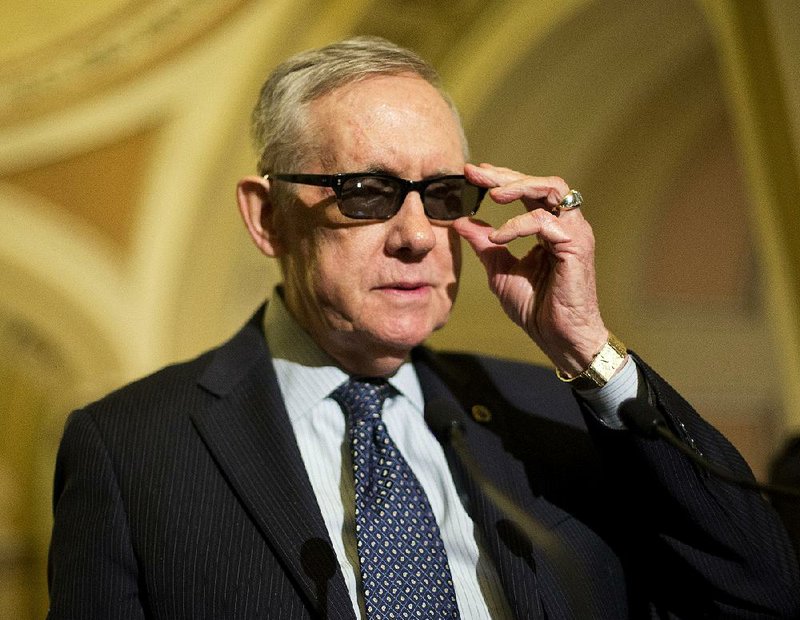WASHINGTON -- House and Senate Republicans steamed ahead Tuesday toward their goal of the approval of balanced-budget outlines, essential early steps along a path to send President Barack Obama legislation to wipe out his 5-year-old health care law and eliminate deficits within a decade.
Obama has previously said he will veto legislation that threatens the Patient Protection and Affordable Care Act, but Republicans in the House paid that little mind.
"I campaigned ... with my heart and soul to get rid of Obamacare, and it's the one shot that we've got to get something on his desk," said Rep. Matt Salmon, R-Ariz.
At a news conference, Rep. Steve Scalise of Louisiana, the third-ranking GOP leader in the House, cited two reasons for the rank and file to approve the budget, saying it would "get our economy moving again and also set the stage for a repeal of Obamacare."
Democrats criticized the plans in both houses, particularly the proposed repeal of the health care law and the billions of dollars in recommended cuts to social programs at the heart of the GOP deficit-reduction program.
Senate Minority Leader Harry Reid of Nevada said the Senate Republicans' budget protects the super-rich at the same time it "takes health care away from 16.4 million Americans ... wreaks havoc on Medicare ... makes drastic cuts to Medicaid ... and guts nutrition assistance for those in need."
Rep. Joaquin Castro, D-Texas, said, "It would devastate American families."
A final vote could come today on the House plan, and late Thursday or early Friday on the Senate's slightly different version.
Next, Republicans hope to forge a compromise budget quickly, settling on nonbinding targets for spending and taxes.
While the House and Senate budget proposal plans differ, they both hew to the same principles: an overhaul of the tax code and an end to red ink in 10 years or less. That would mean roughly $5 trillion in cuts in projected spending over the next 10 years, much of it from the presumed repeal of the health care law, and the balance from changes to Medicaid, food stamps, welfare and other benefit programs.
The House proposal also called for remaking Medicare into a voucherlike program in which new beneficiaries beginning in 2024 would shop for coverage from private insurers. The Senate alternative omitted the proposal.
Both the House and Senate proposed increasing defense spending over currently projected levels, with Republicans saying they did not want to fall behind Obama's own recommended increase for the Pentagon.
In the House, the leadership decided to allow votes on rival plans -- one with recommended defense spending about $2 billion higher than the other. The alternative with more support will advance to a final vote later in the week.
Republicans have sought to repeal the Affordable Care Act since its enactment five years ago. They have argued against provisions of the law such as one requiring most businesses to offer insurance, which they said would increase costs for small businesses and hurt the economy.
Now, with Republicans in control of the Senate, House Republicans have every expectation that a repeal measure would pass both houses and go to the White House.
Separately Tuesday, House leaders predicted that their chamber will approve a bipartisan compromise this week preventing deep cuts in physicians' Medicare fees and extending health care funds for children and low-income people.
After weeks of private talks between House Speaker John Boehner and Minority Leader Nancy Pelosi, top Republicans and Democrats released final details of their agreement Tuesday.
Boehner, R-Ohio, said one major accomplishment is the measure's increase in medical premiums paid by high-income Medicare recipients. That marks a rare though modest bipartisan agreement to retool the costly health insurance program for the elderly, which is an important selling point to conservatives usually opposed to boosting federal red ink.
Pelosi, D-Calif., said the measure would get "a strong vote" from Democrats. She said she was glad the package would provide two more years of extra money for the popular Children's Health Insurance Program.
The measure's fate is less certain in the Senate, where some Democrats have criticized the measure's added costs for Medicare beneficiaries and curbs on abortions at the nation's community health centers for low-income Americans.
Information for this article was contributed by Chuck Babington, Alan Fram, Laurie Kellman, Stephen Ohlemacher and Erica Werner of The Associated Press.
A Section on 03/25/2015


